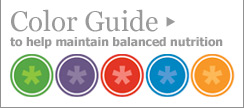Stage
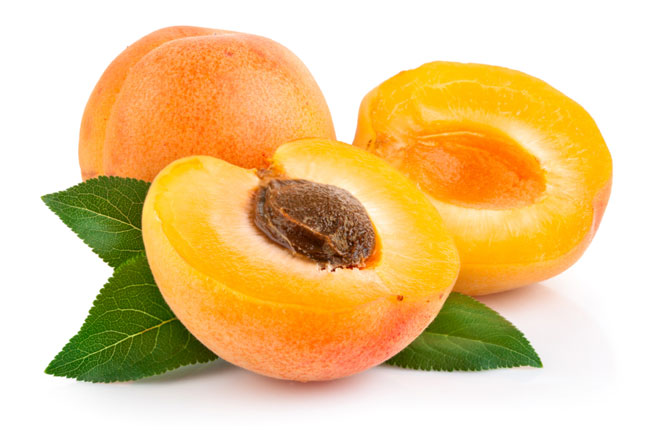
There’s a reason why apricot means “precious” in Latin.
This healthy summer fruit is loved by both babies and mothers alike. Closely related to plums, apricots can be a great addition to your baby’s meals. Their vibrant orange color reflects the fact that they are an excellent source of beta-carotene, which your baby’s body converts to vitamin A. Apricots are also loaded with vitamin C, fiber, iron, potassium, calcium, and antioxidants. Collectively, these healthy ingredients help to promote growth and development, while protecting your little one’s body against various cancers and heart disease. Apricots are also often used as a very effective remedy for constipation. Most pediatricians recommend introducing apricots into your baby’s diet when she is six months or older.
Best served in late spring and summer.
Typically, fresh apricots are difficult to find out of season, and they taste much better when there are in season. Although baby food apricots are readily available throughout the year, if you choose to make your own recipes, May to October is the best time to buy this healthy fruit. Choose organic apricots whenever possible. Although apricot peels are edible, many moms choose to peel the outer coating by first boiling the apricots, followed by submerging them into ice water. Apricots are ready to serve and do not need to be cooked. However, you may also steam or simmer apricots in water for a few minutes to make them more digestible. Apricots are also great pureed and are the perfect substitute for peaches and nectarines in any baby food recipe.
Interesting apricot facts.
Known within scientific circles as “Prunus armeniace” (Armenian plum), the apricot is believed to have originated in Armenia during ancient times. Greek mythology experts believe apricots are the “golden apples” of Hesperides – the fruit Hercules was ordered to pick in the eleventh of his twelve labors. In English folklore, dreaming of apricots is considered good luck. About 95% of the apricots grown in the U.S. come from California.
Easy apricot recipes for any stage.
If you are looking for a little apricot recipe inspiration, try these nutritious and delicious dishes.
- Apricot puree is an ideal first food for baby.
- No-bake apricot bites are a fun and healthy snack that’s an ideal stand-in for sugary snacks like cookies or many store-bought granola bars.
- Apricot glazed chicken is a dish that your entire family will enjoy and is especially yummy when served with our apricot wild rice.
Stage 5
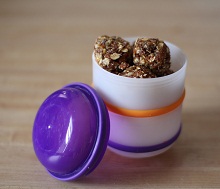
These apricot bites make a sweet and nutrient-packed snack!
- 1 cup dried apricots, chopped
- 1/3 cup dates, chopped
- 1/2 cup oats
- 2 tbsp almond butter, unsalted
- 1 banana, mashed
Remove the pit from the dates. Using a food processor, finely chop the dried apricots and dates. Add oats, almond butter and smashed banana. Add salt to taste, if desired. Mix all of the ingredients together and form into a dough. Roll into bite size pieces. You can serve them right away, or refrigerate for 45 minutes to firm before serving.
Recipe Yields: 16 Servings
Store in the refrigerator or in the freezer.
Storage Time: 5 days in the refrigerator
Stage 5
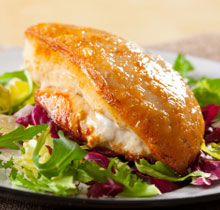
- 3 apricots, diced
- 4 whole dried apricots, finely chopped
- 1 whole shallot, finely diced
- 1 1/2 cup vegetable broth
- 1 cup water
- 2 tbsp white vinegar or apple cider vinegar
- 2 tbsp sugar
- 2 tbsp of apple sauce
- 1 tsp all spice
- 1 whole bay leaf
- 1/2 tsp salt
- 1/2 tsp paprika
- 1 tsp orange zest
- 4 Chicken Breasts
- 1 tsp thyme
- 1 tsp rosemary
- salt and pepper to taste
In a sauce pan, add diced apricots, chopped dried apricots, shallot, vegetable broth, water and vinegar. Bring to a boil. Add sugar, applesauce and remaining spices (you can substitute the applesauce and sugar for 1/3 cup of molasses). Cook over medium heat stirring often until sugar is dissolved. Simmer on low for 5-7 minutes. Remove from heat and remove bay leaf. Brush glaze on chicken breast and season with thyme, rosemary and salt/pepper to taste. Heat oven to 365 and cook for 25-30 minutes (depending on thickness of breast). The temperature of the chicken should be 165 degrees. For infants, puree until desired consistency it met.
A serving size is half chicken breast for toddlers, makes 8 half chicken breast servings.
Recipe Yields: 8 Servings
Freeze unused portions for future meals.
Storage Time: 3 months in the freezer
Stage 5
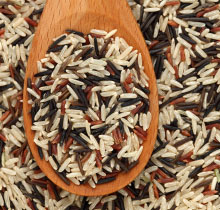
- 1/2 cup wild rice
- 1/2 cup brown rice
- 2 1/2 tsp chicken bouillon granules
- 1/4 tsp nutmeg
- 2 cup water
- 3 cup fresh mushrooms, sliced
- 3/4 cup dried apricots, chopped
- 3/4 cup celery, chopped
- 5 green onions, chopped
Rinse wild rice in a strainer under cold water for about 1 minute.
In a medium saucepan combine rinsed wild rice with brown rice, bouillon granules, and nutmeg. Add water. Bring to a boil; reduce heat. Cover and simmer gently for 45 minutes. If most of the water has been absorbed, add more water. Then add mushrooms, apricots, celery and green onions.
Cover: Boil gently over medium-low heat for 10 to 20 minutes, stir frequently. Vegetables should be tender. Again if water has been absorbed, add about another 1/3 water and transfer to a 2-quart covered casserole. Bake in at 375 for 25 to 30 minutes.
Serve with Apricot Glazed Chicken
Recipe Yields: 4-6 Servings
Storage Time: 3 days in the refrigerator
Stage

Cooking with Cat: Oh-So-Fun Frozen Fruit Cups
A perfect snack for your toddler on the go.
I was really excited to try this recipe, because I knew this would be a cool way to serve fruit in an oh-so-fun way. This is a great recipe for using fresh seasonal fruit, but if that is not available, you can use frozen or canned fruit as well. Just look for fruit in juice instead of heavy or light syrup. These fruit cups are easy to make and help to provide vitamins and necessary nutrients to promote healthy growth for your child. Check out the Nutrient Chart for an overview of essential vitamins and minerals your baby needs.
Here is what you will need to make the Oh-So-Fun Frozen Fruit Cups:

3 ripe bananas, mashed
1 can 13.5 oz crushed pineapple (do not drain)
1 can or 2 1/2 apricots, cut up (do not drain)
1 cup of pureed blueberries
1 can 6 oz. frozen orange juice (use apple juice for children under 12 months)

Puree blueberries.
Note* Measure 1 cup of blueberries and add water as needed for the puree.

Cut apricots.
Note* If apricots are in season, use fresh. If not, canned works too!

Pour apricots into bowl with crushed pineapple.

Mash bananas.

Pour mashed banana into bowl with pineapple and apricots.

Pour blueberry puree into fruit mixture.

Pour in orange juice.
*Note I made one can of frozen orange juice and used half of the orange juice. Make sure to read the label on the juice and avoid any thing that contains high fructose corn syrup.

Mix all ingredients together.


Pour into Freezer Storage cups or muffin liners. Place in freezer overnight.
Note* For multiple servings, you can freeze in any airtight container. If you are using muffin liners, make sure to cover them.

To serve, remove from freezer and allow to thaw until the fruit is in a slush form and enjoy.
Stage 5

- 3 ripe bananas, mashed
- 1 can 13.5oz crushed pineapple (do not drain)
- 1 can or 2 ½ apricots, cut up (do not drain)
- 1 cup of pureed blueberries
- 1 can 6 oz. frozen orange juice ( use apple juice for children under 12 months)
Mix all ingredients and pour into Food Storage Pods or muffin liners. Place in freezer overnight.
Makes approximately 5 Frozen Fruit Cups
Stage 1 + 2
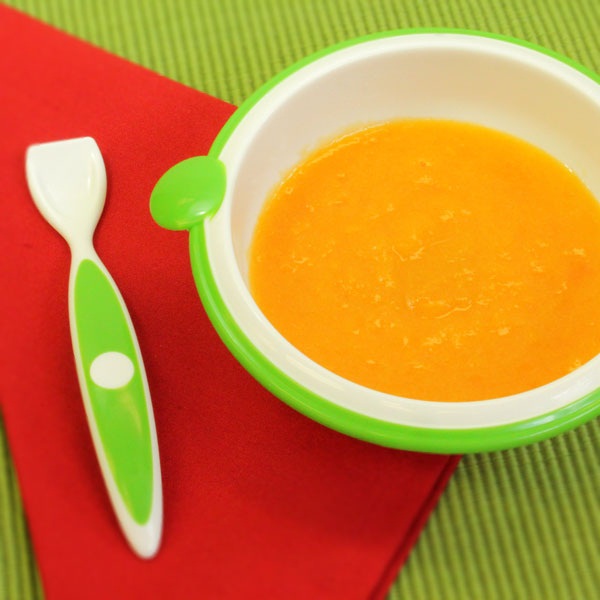
Apricots are a sweet source of potassium, magnesium, vitamin A and C.
4 to 6 apricots will make approximately 1 cup of puree.
Wash, peel and pit apricots, then cut the fruit into small pieces. Blend until smooth with immersion blender. Add breast milk or water to thin the puree to the desired consistency.
As your child grows into stages three and four, mash the apricots for a chunkier consistency, or simply dice apricots into pieces, sized for little fingers to pick up easily.










